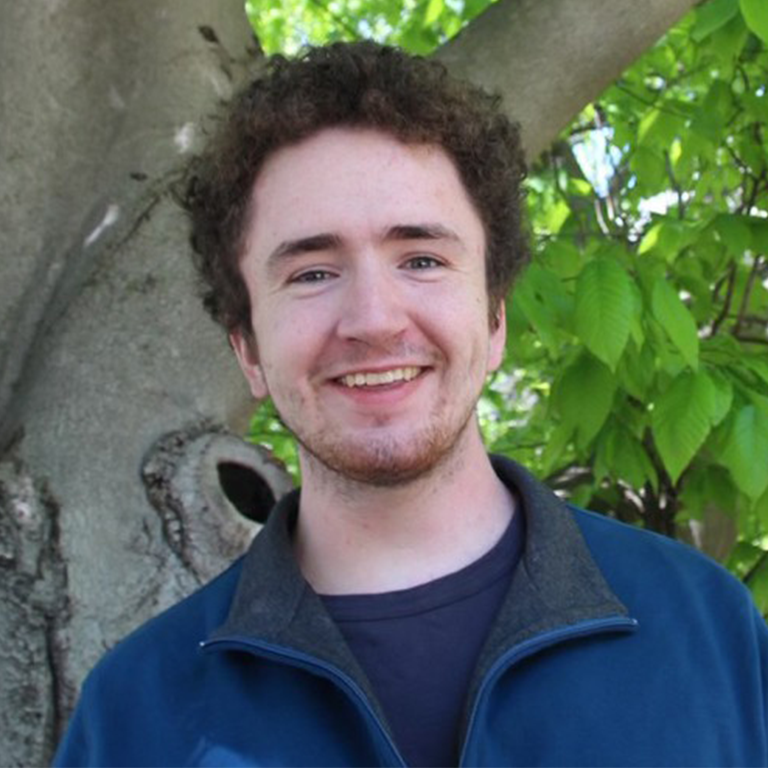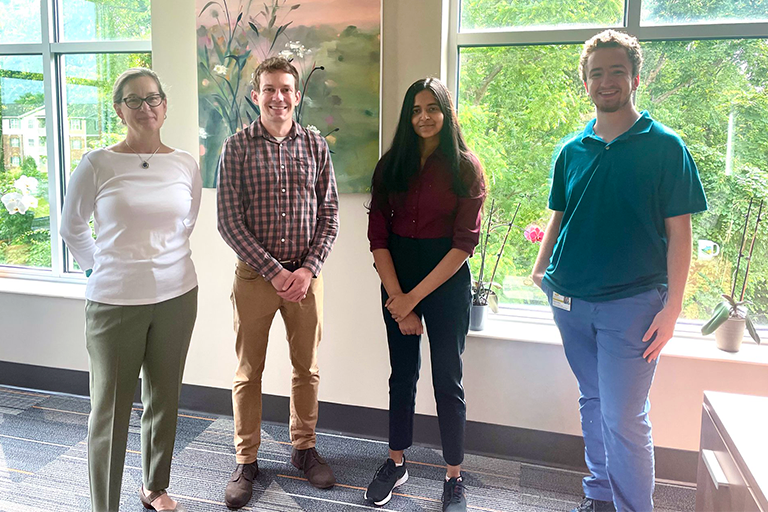This Q&A series highlights McKinney Climate Fellows alumni and their professional journeys within Indiana and beyond. The McKinney Climate Fellows program, administered by Indiana University’s Environmental Resilience Institute and Integrated Program in the Environment, connects IU undergraduate and graduate students interested in climate, sustainability, and community resilience with career experiences.
Matthias Benko’s journey toward a climate career started with an interest in birds and his desire to protect vulnerable species. As a two-time McKinney Climate Fellow, his expertise expanded to trees. In back-to-back summers, Benko worked with Indiana Nature and the Town of Zionsville on tree ordinances and planting plans related to sustainability. The experience not only attuned him to another aspect of the natural world but also to people and the importance of engaging community members on environmental issues.
At the time of this interview, Benko was wrapping up a climate adaptation fellowship with the U.S. Fish and Wildlife Service, his first post-graduation position. Benko joined the U.S. Department of the Interior in April 2024 as an environmental protection specialist.
The following interview has been lightly edited for length and clarity.
What major projects did you work on during your McKinney Climate Fellows placement with Indiana Nature and the Town of Zionsville?
With Indiana Nature, I was focused on tree and vegetation ordinances. I looked through Indiana’s county and city tree ordinances to analyze how sustainable they were. My major project that summer was creating a database and report of all existing ordinances. For Zionsville, the major project was making a tree planting plan for climate resilience that included a priority planting analysis, community engagement, and making conclusions and recommendations based on town tree lists.
What did you learn as a McKinney Climate Fellow and how did it inform your career path?
I learned how to think about sustainability on the local level. It’s not just things like GIS and data gathering, it’s important to talk to the people impacted by this work. If you don’t talk to people in the community, a plan can only mean so much. Everything I learned during the Climate Fellows program I’ve had in the back of my mind at my current job. I credit the Climate Fellows program with launching my career, and I’m very grateful for the experience.
What called you to pursue a career focused on climate and sustainability work?
My passion for the environment started when I was 10. I got really interested in birds and birdwatching. I’d find myself wondering who would protect these parks in which the birds lived in; I thought if I don’t do something, who will? That question had been in the back of my mind since I was 10 or 11, and that made me want to major in environmental studies and geography.
I credit birds with getting me into environmental work. The further I’ve gone in this field—I just can’t imagine doing anything else. I believe that the climate is one of the most pressing issues that we deal with because it affects every single system. And it’s not just an environmental issue, it’s an equity issue. Without those birds, I don’t know where I’d be.
What is your current position and what responsibilities does your job include?
I’m currently a climate adaptation fellow at the U.S. Fish and Wildlife Service working on nature-based solutions. Nature-based solutions (NBS) are the unity between biological concepts like restoration work and the social dynamics of incorporating equity, diversity, and inclusion. My job is heavily project management based, so I assist with the Service’s NBS working group and run a partnership implementation sub-team of that group. I also help coordinate the wildlife refuge system’s Inflation Reduction Act resiliency projects. Then, I have a bunch of smaller projects, such as developing NBS case studies for the Conservation and Adaptation Resources Toolbox. I wear a lot of different hats.
What do you like most about your current job?
I enjoy the opportunity to learn about and see how the federal government functions. It’s very different from the nonprofit and private sectors because there’s more incremental steps you must go through. You do a lot on a day-to-day basis, but you have to be patient because the return is slower than it would be in, say, a private company. I’ve liked learning the process a lot, and it’s helpful to understand how it all works. I’ve also enjoyed working on my two climate adaptation case studies.
How did the McKinney Climate Fellows program help prepare you to succeed in your current role?
The number one way was working with people. The McKinney Climate Fellows program was my first couple internships and really got me off the ground. It's one thing to take all these classes at IU, but I had the opportunity to apply the environmental knowledge I gained in a practical way. Having conversations with people about sustainability was also very valuable. I’ve gone progressively from the local level all the way to federal. What's missing in the federal government is the understanding of what’s happening on the ground and some of those foundational grassroots skills. I’ll forever appreciate gaining those skills.
What advice do you have for someone who is interested in the environmental and sustainability field?
Be resilient. It’s tough not only to get your foot in the door, but it’s a tough sector to work in. There are so many external factors you have to go against just to do the work to help the earth and fight climate change. It can get really discouraging to see all those reports come out about disasters and how we’re not doing enough, but you must keep putting in the work and be resilient.
The most important thing I’ve learned is to not get too bogged down. So, the number one piece of advice I have is to be resilient, and number two is to keep talking to people and learn. That’s your job as a student and intern, to just take the opportunity to be a sponge and learn.
About the Environmental Resilience Institute
Indiana University’s Environmental Resilience Institute connects a broad coalition of government, business, nonprofit, and community leaders to help Indiana and the Midwest better prepare for the challenges of environmental change. Together, we integrate research, education, and community to create environmental resilience and climate solutions—building a more sustainable, equitable, and prosperous future. Learn more at eri.iu.edu.
About the Integrated Program in the Environment
Bringing together faculty, students and staff across 10 Indiana University schools, the Integrated Program in the Environment is a hub for academics, research, and activities focused on the environment. Administered by the O’Neill School of Public and Environmental Affairs, the School of Public Health, and College of Arts and Sciences, IPE is preparing the next generation of environmental and sustainability leaders. Learn more at environment.indiana.edu.





